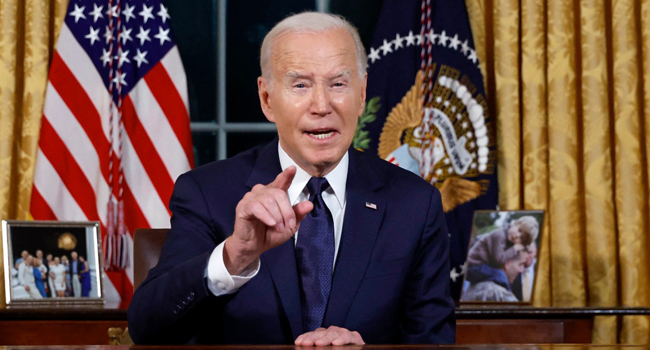Israel has agreed to daily four-hour military pauses in northern Gaza for humanitarian purposes, the White House said Thursday, even as President Joe Biden said there was no chance of a full ceasefire.
Biden has been pressing Israeli Prime Minister Benjamin Netanyahu for longer breaks in the fighting after more than a month of war sparked by the October 7 attacks by Hamas.
White House National Security Council spokesman John Kirby said the pauses were “significant steps forward” as heavy fighting took hold of Gaza City in the north of the Gaza Strip.
“Israel will begin to implement four-hour pauses in areas of northern Gaza each day, with an announcement to be made three hours beforehand,” Kirby told reporters.
“We’ve been told by the Israelis that there will be no military operations in these areas over the duration of the pause (and) that this process is starting today.”
The pauses would allow humanitarian aid to get into the area and allow civilians to flee the fighting, he said.
Israel had also opened up “humanitarian corridors” for the past few days that had already allowed “many thousands” of people to leave the worst-hit area of north Gaza to the south, Kirby added.
“We would like to see pauses continue for as long as humanitarian assistance is needed,” he said. But Israeli military spokesman Richard Hecht appeared to downplay the pauses. “It’s not a shift,” he told reporters. “These are tactical local pauses for humanitarian aid, which are limited in time and area.”
Fighting has raged since gunmen from the Islamist group Hamas poured over the Gaza border with Israel and, according to Israeli officials, killed 1,400 people and seized about 240 hostages in the worst attack in the country’s history.
Vowing to destroy Hamas, Israel retaliated with an aerial bombing and ground offensive that the health ministry in the Hamas-run Gaza Strip says has killed more than 10,800 people, many of them children.
International calls for a ceasefire have mounted, as have protests, including one at the weekend which targeted the White House. However, Biden ruled out a longer truce for now.
“None. No possibility,” Biden told reporters when asked about the chances of a ceasefire.
He said he was “still optimistic” about freeing hostages — including the fewer than 10 US citizens held in Gaza. “We’re not going to stop until we get them out.”
He later confirmed that in a call with Netanayhu that “I’ve asked for a pause longer than three days”. When asked if he was frustrated with Netanyahu, he said, “It’s taken a little longer than I hoped.”
The United States has firmly stood by key ally Israel since the attacks, saying that Hamas cannot be allowed to remain in control of Gaza.
But Washington has also been publicly calling on the Israeli military to obey the “laws of war” and avoid civilian casualties, while privately pushing Israel to scale back its offensive and to develop a plan for what comes next.
Biden visited Israel in October in a show of support. During the trip, he announced that Egypt had agreed to open the Rafah crossing into southern Gaza to let aid trucks in.
Israel has pressed on with its offensive and has encircled northern Gaza in recent days. It said Thursday it had fought a 10-hour battle that toppled one of the Palestinian militants’ strongholds.
Biden has also warned Iran and its ally Hezbollah against widening the conflict, but repeated attacks on US forces by Tehran’s proxies in recent weeks have raised tensions.
Asked why US warplanes had carried out fresh strikes on an Iran-linked weapons facility in eastern Syria on Wednesday, Biden said “Because they struck us” and said US forces would strike again “if we have to.”












